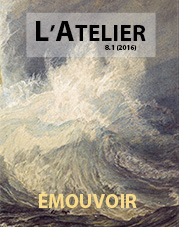Can Realism Speak of Affect?
Keywords:
Affect, Emotion, Realism, Novel, Literary TheoryAbstract
Can realism speak of affect? The question may at first appear surprising: why, after all, should the codes and tropes of a specific literary tradition necessarily prevent the exploration of an entire aspect of subjective life? The interrogation takes on greater meaning if we understand the notion of affect according to the acceptation, framed in the libidinal philosophy of Jean-François Lyotard, which poses affect as that part of conscious experience which ceaselessly escapes the awareness of the feeling subject. In these versions of the concept, affect not only resists outward presentation in the form of language or descriptive signs, but escapes representation of the self to itself. The feeling subject is not only unable to express or describe such affect to others – for it is, by definition, outside of any representative impulse – it is unable to represent it to itself even at the initial level of conscious awareness. What happens then if we are to apply this modern comprehension of affect – as that which, as Brian Massumi puts it, is “not ownable or recognizable” – to the functioning of literary realist modes? Does the ideal to better “speak of” affect in literary form imply the adoption of consciously anti-realist modes?
Le réalisme peut-il parler de l’affect ?
Le réalisme peut-il parler de l'affect ? La question peut surprendre : en quoi les codes et tropes d'une tradition littéraire spécifique pourraient-ils empêcher l'exploration de tout un pan de la vie subjective ? L’interrogation cependant prend son sens si nous comprenons la notion d'affect à la lumière de l'acceptation, forgée dans la philosophie libidinale de Jean-François Lyotard, posant l’affect comme la dimension de l'expérience consciente qui échapperait sans cesse à la connaissance du sujet. Dans cette perspective, non seulement l’affect résiste à une présentation d’ordre extérieur sous la forme du langage ou des signes descriptifs, mais elle échappe encore à la représentation intérieure de soi à soi. Incapable d'exprimer ou de décrire un tel affect à d’autres – en ce qu’il est, par définition, au dehors de toute impulsion représentative, le sujet est alors incapable de se le représenter à lui-même, au premier degré même de la connaissance subjective. Que se passe-t-il dès lors si nous appliquons cette compréhension moderne de l'affect – ce qui, comme l’affirme Brian Massumi, ne peut être « ni possédé ni reconnu » – au fonctionnement des modes réalistes littéraires ? L'idéal de mieux « parler de » l’affect dans une forme littéraire implique-t-il l'adoption de modes consciemment anti-réalistes ?
Published
Issue
Section
License
- Work submitted for publication must be original, previously unpublished, and not under consideration for publication elsewhere. If previously published figures, tables, or parts of text are to be included, the copyright-holder's permission must have been obtained prior to submission.
- Authors of accepted manuscripts will assign to L'Atelier the right to electronically distribute their article, or publish it in any form (Internet, CD ROM, printed copy) but authors will retain copyright and, after the article has appeared in L'Atelier, authors may republish their text (in print and/or electronic form) as long as they clearly acknowledge L'Atelier as the original publisher.


